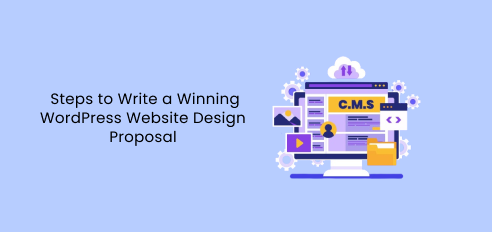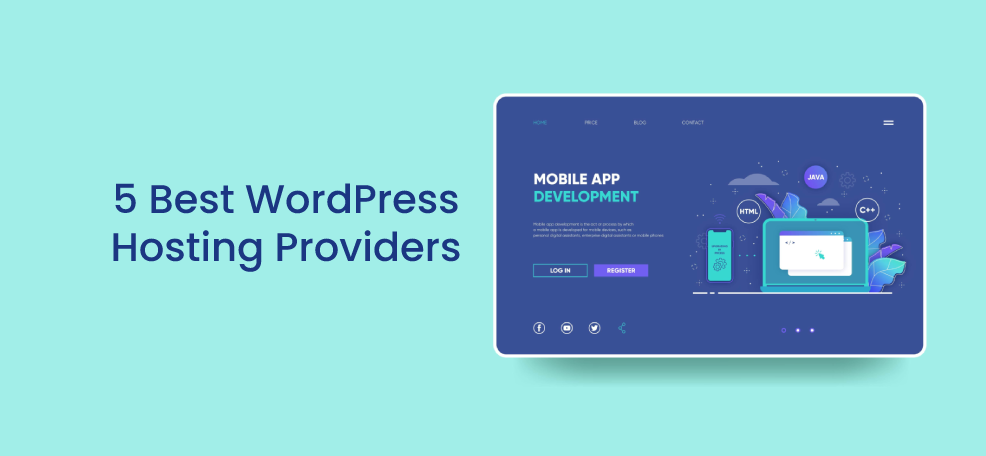When it comes to comparing website builders, most people don’t even know that there are two options for “WordPress.” This can lead to more confusion when telling people that WordPress is better than another option. Some people might not know if you mean WordPress.org or WordPress.com (and there is a difference!)
In a sense, WordPress.com is fully managed by the WordPress organization. However, WordPress.org requires you to organize which software installation you want and hosting options.
Still, understanding what the two are is the first step. Now, you have to focus on which one is better for your needs. We’re going to talk about both options, comparing all the different features and pricing options so you’ve got a pretty good idea of what each can do.
What to Know about WordPress (in General)
WordPress is a software or a program that lets you build a blog, website, and/or online store. It is fully functional and all online, so some people also call it a web application. Others call it a CMS (Content Management System), as it allows you to manage media, blog postings, text, and your e-commerce product.
The point here is that it is opensource and free. That means anyone who wants to can download it and use it.
Of course, it’s so popular because it’s powerful. A rough estimate is that about 34 percent of all internet sites are through WordPress. It’s available in 50 different languages and continues to grow rapidly, which is a small feat in and of itself, seeing as it only launched officially in 2003.
Regardless of whether you choose to use WordPress.org or WordPress.com, you’re going to be using the software for WordPress.
What’s the Main Difference Between the Two?
If you have a wordpress.com website, it’s fully hosted through WordPress. There are free and paid plans available, and the domain, software, and servers are all managed by it. With WordPress.org, you just download the software. Then, you still have to organize the installation with a domain that you own, as well as manage the hosting yourself.
Setup and Installation
Understanding the main difference is the first step. You should realize by now that one is much easier to set up and create. WordPress.com is clearly managed for you, so it is the simple solution.

From WordPress.com, you can choose between blogs, business, online store, and professional websites. Don’t worry about picking wrong, as you can always go back and change your selection later.
To get started on WordPress.com, you must:
- Sign up for the service.
- Choose the kind of site you want.
- Enter your site name.
- Use a free or purchased domain name (more information in the pricing section of this review)
- Pick either a free or paid plan.
- Start creating your website!
With WordPress.org, there is more involved:
- You must buy your domain name first.
- Find a buy the appropriate web hosting plan (Siteground, Dreamhost, etc.)
- Create a database for the program on your server.
- Download and install the WordPress software.
- Upload your new software to the domain with the FTP client.
- Visit the URL to run/install the scripts.
- Start creating your site!
Of course, this all sounds a bit overwhelming, but there are plenty of guides to help you get started. Therefore, it isn’t hard, necessarily, but it does take more work.
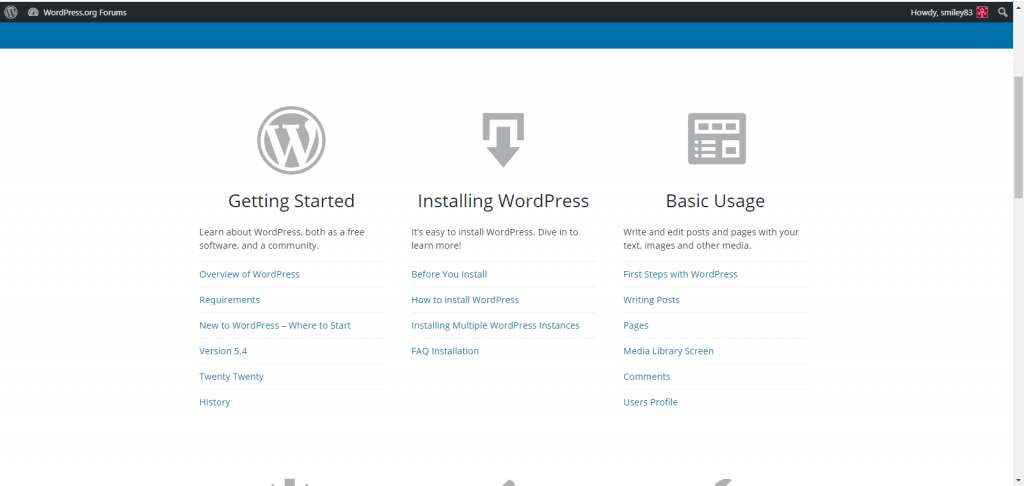
Some web-hosting apps allow for one-click installation of WordPress. If yours does this, then you can skip some of the steps above.
The winner here is clearly WordPress.com. You just follow the prompts on your screen, and everything is taken care of for you.
Ease of Use (in General)
Once you’ve installed them both, they run similarly. Remember, they both use WordPress software. The only difference you may find is that WordPress.com offers more limited features. Still, if you’re a beginner, this could be beneficial for you.
Keep in mind that WordPress isn’t the easiest option to build a website. Other versions allow drag-and-drop features and a ‘what-you-see-is-what-you-get’ editor. However, we are focusing primarily on WordPress today.
For ease of use, we’re going to say that Wordpress.com is the winner, primarily because of the limitations.
Customization and Design
Creative control is what this section is all about. Is it easy to change the feel and appearance of your site? What options are there for pre-made themes?
We’re going to focus on WordPress.com first. Right out of the box, you get about 100 free themes and can buy premium themes, of which there are 200. However, you can’t buy all the themes unless you choose a paid plan.
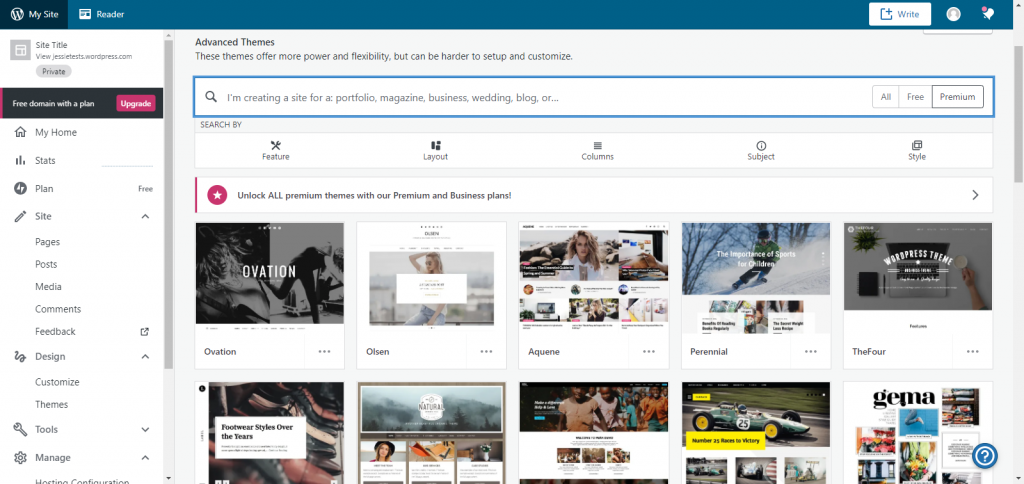
This means you don’t have a lot of options when on the free plan. Still, the good thing is you do have a variety of excellent themes to pick, and they’re responsive (people on smaller screens also get a good view of the theme). Also, you can make general edits, but you need a paid plan to customize CSS code.
With WordPress.org, there are no limitations. You have access to potentially thousands of themes and can edit the source code whenever you want. There are also plugins available so that you can build a unique theme using drag-and-drop tools.
You can also find premium and free templates from a variety of other websites, including Elegant Themes and Themeforest.
The winner here is clearly WordPress.org with its design flexibility. Of course, it may take a bit more work to customize the way you want, but it’s worth it in the end.
Plugins and Features
It seems that everyone knows what a WordPress plugin is, and it’s one of the reasons the software is so popular. For example, WooCommerce helps you build your online store while WPML makes your website multilingual.
There are too many plugins to list here, and at WordPress.org, you’ve got more than 54,000 premium and paid plugins available to you. They aren’t all perfect and great because any developer is allowed to submit a plugin to its store. Still, there is a variety from which to choose.

Plus, you can make almost any kind of website you desire because of the WordPress plugins. While business and blog sites are popular, you can also create an online newspaper, real estate site, photography portfolio, and much more. Still, there is a catch to all of this.
On WordPress.com, you can only install a couple, and you need to be on a paid plan. There are pre-installed plugins available, such as Essential SEO and Social Media buttons, but your choices are highly limited.

There is a reason for the restrictions on Wordpress.com. Primarily, the website selects your plugins for you based on the goal of your website. For example, a blog is going to have better commenting options. An online store requires the purchase of its e-commerce plan, so it’s going to have specific plugins relating to that.
In a sense, it’s similar to the iOS wall-garden policy. With it, you’re more limited but can make fewer mistakes. With Android, you can do what you want, but you’re more at risk.
The winner here is WordPress.org because of sheer choice available without any restrictions on what can be installed.
Blogging
WordPress was initially created for blogs. Therefore, you can be sure that anything to do about blogging is available from the software and easy to do. This includes:
- Embedding images, text, links, audio, videos, etc.
- Adding medial from the library
- Creating/scheduling posts
- Managing comments
- Customizing typography
- Easy to understand dashboard for managing the posts
- Detecting spam
- Much more
Whether you go through WordPress.com or install it through WordPress.org yourself, it’s one of the best blogging platforms within the world. With that said, we’re going to call it a tie for blogging, though ease-of-use comes into play, which makes WordPress.com the winner.
Online Stores
With a variety of e-commerce plugins, you can easily turn the site into an online store. You’ve got full flexibility over accepting payments, shipping options, and editing your products. It’s possible to build any type of e-commerce site and style it the way you want on the Wordpress.org version with the plugin selections available.
WordPress.com does allow you to use the WooCommerce plugin, but only if you pay for the plan. For those working at an entry-level situation, this company does offer other plugins, so you can still:
- Take donations and payments
- Add pictures, products, text, and multimedia
- Set up taxes, pricing, and shipping
- Accept payments through the Simple Payments Block
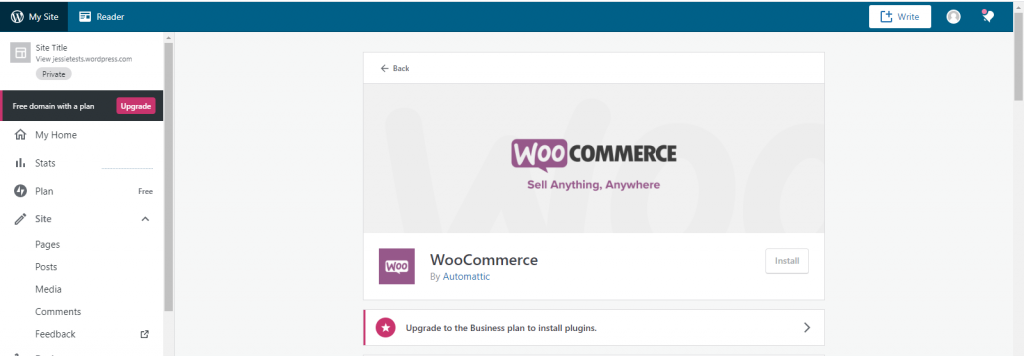
Again, the issue here is that WordPress.com doesn’t allow you to do much with the free plan, and most people want to spend as little as possible while setting up their online store. There’s less flexibility, even though it is easier to use. With WordPress.org, you’ve got control over the store, regardless of what you pay.
Pricing
Remember earlier, when we mentioned that WordPress is opensource and free? Well, it is, but, in a sense, you have to host it, so that is going to cost money. You can choose to let WordPress do that for you or do it yourself.
Then, you’ve got premium themes and plugins, which can range from $30 to $150 (one-time fee) and $5 to $150 per month, respectively.
Still, let’s try to keep it simple here.
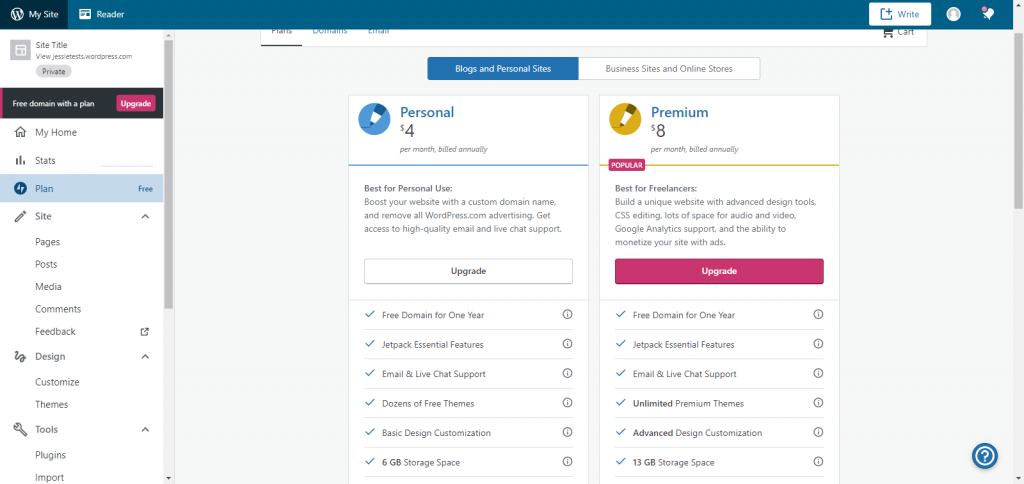
For the blogs and personal sites, you can choose to pay $4 or $8 and get varying degrees of extras.
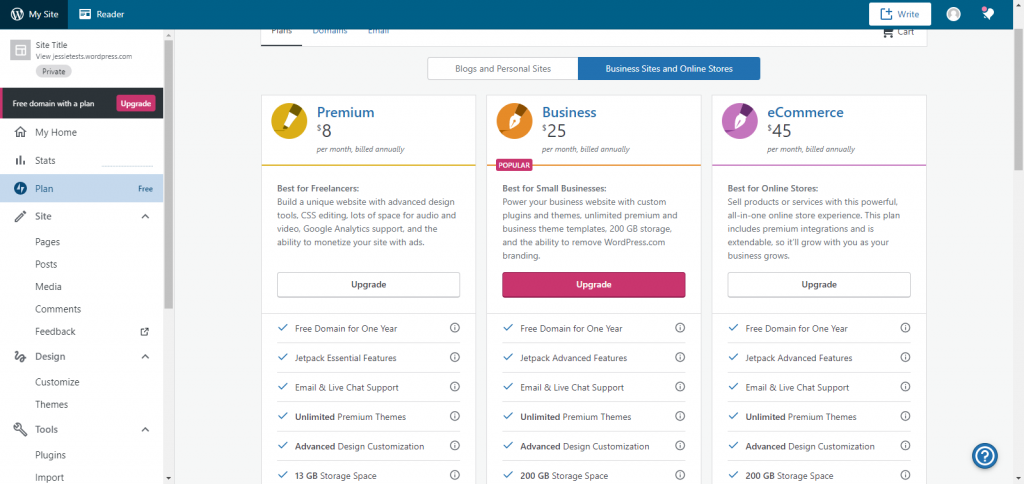
Online stores and business sites have a few more options and a variety of features with the higher-priced plans.
There is also a free plan for Wordpress.com, but it comes with ads, you don’t get to choose the URL, and there are limited features. Plus, you can’t install plugins or have access to monetization and e-commerce functionality.
The domain prices for WordPress.org are the same, but remember, you have more control over your hosting expenses. Usually, the cheapest providers can range from $5 to $40 a month, depending on your needs.
Though it is a bit messy and confusing, we feel that the winner here is WordPress.org because you have more flexibility. The .com version has higher prices when compared to other website builders, as well.
Support
The one thing you’re going to be surprised about is that WordPress.org doesn’t have an actual support team. You can find information through the forums and FAQ section. Still, it’s a daunting task to scroll through pages upon pages of info to get what you need. Then, if you can’t find it, you’ve got to post to the forum in hopes that someone is going to respond promptly.

Sometimes, you can get help from your hosting provider, but that depends on which one you choose. Still, you might have to deal with the theme provider or the plugin provider if the issue comes from them.
WordPress.com, on the other hand, offers excellent support, but only if you’re on a paid plan. The free hosting only provides community forums for help. Still, those who pay for the subscription (billed annually), get live chat or email support. This depends on the tier level you choose.
The winner here is WordPress.com for paid plans, though neither option is very good about support.
Maintenance and Security
Your site has to be secure, especially if you’re taking people’s payment information. Therefore, the software needs to be updated regularly.
WordPress.com does all this for you, so there is no need to focus on the compatibility of plugins, release note checks, or updating.
However, with WordPress.org, you have to ensure that the plugins and software are updated regularly. Still, the software notifies you through the dashboard to check for updates, so you just have to click the button every one to two weeks. Also, your hosting provider might manage your WordPress installation and take care of any updates.
There is still a need for SSL certificates and the like. They help to encrypt the website and ensure security. Google and other search engines put more favor on those sites that have SSL certificates and show “https” in the bar. WordPress.com does all that for you.
Your hosting provider should handle these needs if you’re using WordPress.org, but not all of them offer it. Make sure it’s part of your plan or buy it separately if necessary.
The winner here is, of course, Wordpress.com because it takes care of everything.
WordPress.org VS WordPress.com: Which Is Better?
By now, you should better understand the differences between the two options. While WordPress.org does win in our comparison, they both have good and bad features, so we can’t really say if one is better than the other for your business. We can offer a few tips here, though. For example:
- If you want an out-of-the-box solution that’s simple and easy to set up, then WordPress.com is where to go and offers great deals.
- Those who want full flexibility and control are going to want a self-hosted website from WordPress.org.
- When you don’t desire to spend money on your website, it is possible to go with the WordPress.com one, but there are limitations.
- If you’ve got specific needs for your website, it might be better to go with WordPress.org, so you have access to the paid plugins.
Now that you know which one is going to work best in certain circumstances, you can make sure you’ve picked the best WordPress option for your needs.


